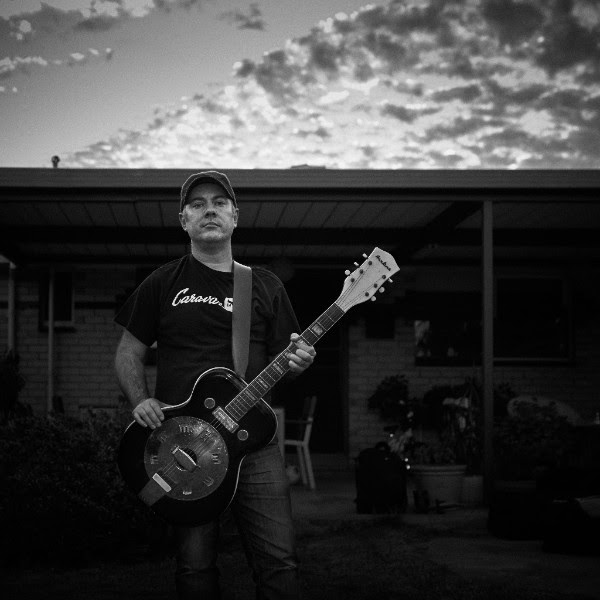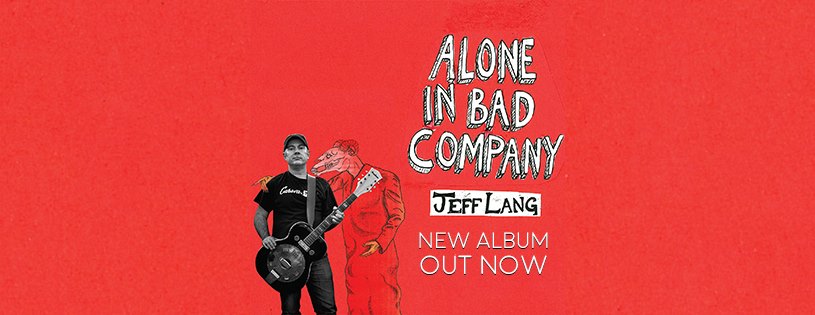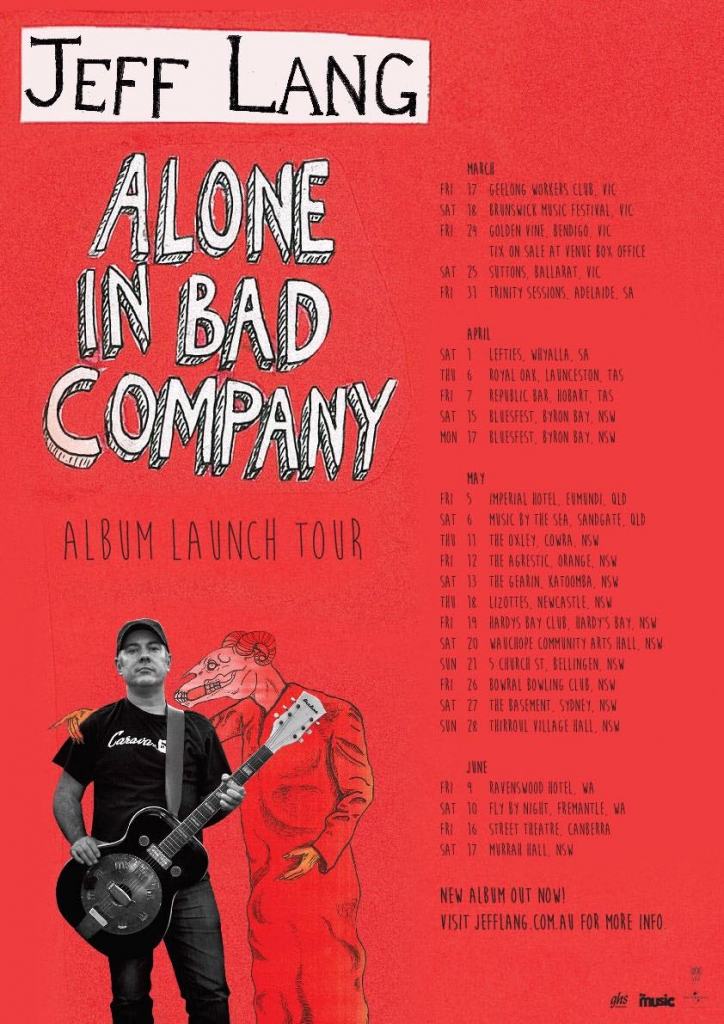Project Description
Q & A with Jeff Lang
Humble though he may be, Jeff Lang is arguably one of Australia’s best songwriter/guitarists. Having worked with some of the best musicians in the business over the last decade or so, he’s adept at both collaborative projects and solo pursuits, the latter of which brings us to his latest release, Alone in Bad Company.
In this interview with Jackie Smith, Lang discusses the inspiration behind the album, how he keeps his material fresh for a live performance, and how his many musical endeavours influence each other.
Congratulations on the recent release of your latest album, Alone in Bad Company. It sounds fantastic. What was the inspiration behind the record?
Thank you. I like setting some kind of rule for each project that puts some restriction on it. They’re usually pretty simple allow for a broad range of outcomes. This time it was that I’d play everything myself. I broke that rule on one song – Palmera Lad – where I had Danny McKenna play drums and Alison Ferrier sing harmonies. But that song aside I stuck to my rule.
What usually inspires you to write new music?
Often I start getting restless, wanting to hear something new that I can’t find on other people’s albums I’m listening to and that’s when I’ll be really itching to start work on a new album. But as far as writing new songs I just have to wait until something taps me on the shoulder and gets my attention.
It can be as simple as a single line, or image and then I try to drop what I’m doing and get as much down during the initial burst of inspiration as I can then look at it later and see whether it works, even what it’s about if that didn’t occur to me when I was scribbling.
How does Alone in Bad Company differ from your previous releases, if at all? Can you talk me through the recording process for this album in particular?
It’s almost entirely made on my own. My more regular approach would be to gather a group of musicians together and track it all at once as a band then after everything is recorded I’ll mix it in a block of days later on.
This time I was recording on my own, often with quite minimalist accompaniment, but even when there was a fair bit going on instrumentation-wise I was playing all the various parts myself. I would work on one song at a time then move straight over to mixing that song on the same day. That definitely gave the sessions a different dynamic, much more of a ‘down in the bunker alone’ vibe.
You worked with Don Walker on Half My Luck. What was that like?
Do you ever get star-struck sharing the stage or working with someone of that calibre?
There is a certain element where I can feel my 14-year-old self sitting there and saying in my ear “Ummm, dude, that’s Don Walker reading your lyrical scraps from your notebook!” Fortunately Don is a very gracious and good humoured fellow. He makes it as painless as you’d hope. I grew up looking up to his writing and I still do. We’d had an agreement to write something together for ages and I finally plucked up the courage to follow up on the idea.
I know you like to collaborate with different sounds and musicians, especially in your work with Maru Tarang, with Bobby Singh, Asin Langa and Bhungar Manganiyar. How does that influence the way you approach a new album? For instance, did I hear the digeridoo on some of the tracks (Fugitive Ghosts and With You I Can Throw Away The Pills)? Is that something you go in knowing you want to include, or is it more a part of the development and recording process?
There’s no digeridoo on those songs, or indeed any other on the album as it happens. With You I Can Throw Away The Pills is just voice and slide guitar, very minimal. Fugitive Ghosts has just an acoustic guitar and electric bass accompanying the singing. I guess you were hearing an implied flavour from the droning open strings?
As far as how the collaborations such as Maru Tarang go on to influence subsequent recordings under my own name: they undoubtedly will do so even in a subliminal way. Whenever I play with that calibre of musician it stretches my abilities and expands my musical vocabulary, sometimes in unconscious or unexpected ways. It’s only natural that you’ll carry that onwards into whatever you do from then on. It’s a happy by-product of those collaborations and I welcome it.
You’ve received numerous accolades for your work, including ARIA Awards for a couple of your collaborative albums, Rolling Through This World and Djan Djan and your solo work respectively. Does that have any influence on how you approach a new project?
All you can do to stay honest is to try and only do things which feel compelling in some way to you at the time. How people receive them shouldn’t be worried about ahead of time. I saw a quote from Lou Reed about the notion of his work being challenging. He said that he does things because he finds them beautiful and that he assumes that if he finds them beautiful that other people will too.
I think that’s a generous and good way to look at it – to not think you’re creating something from a rarefied place that only elites can access or understand. That said I never can quite muster the assumption that people will like what I do, and it’s always a pleasant surprise if and when they do. So, you just go ahead and do the work and hope for the best!
I know you’re about to start touring for the album and, I’ve seen you live a couple of times now, and at both gigs you were fantastic. For those who haven’t seen you live before, what can they expect?
I’ll be touring mostly on my own this time around. There’s still an element of improvisation that takes place within the songs, just poking at and stretching the structures a bit where it feels appropriate. Helps to keep the material fresh. And of course, there’ll be plenty of these new songs added into the mix.
When a gig is at its best it’s kind of mysterious what exactly takes over but those gigs are the ones that I live for, where things happen that you didn’t plan and it feels like we all went somewhere for a while, where the walls dissolve and we’re fully inside the sound.
How do you prepare for a live performance or tour?
Mostly it involves making sure I’m on top of all the lyrics for the newer songs. A bit of pre-tour repetition helps them stick in the old memory. Apart from that it’s “show up on time, be friendly to venue staff, respect your audience and don’t write on the walls on your way out”.










